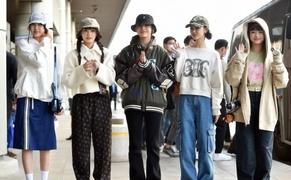The Researchers' Association of the Study of Korea (RASK) in India has now grown big enough to hold international seminars attended by 42 universities and research institutes.
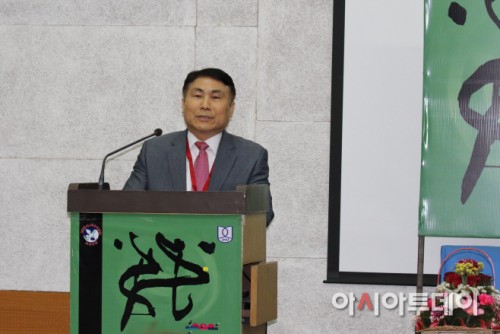 Prof. Kim Do-young, Chairman of RASK and professor of East Asian Studiesat Delhi University, gives a welcoming speech at a two-day internationalseminar on "Indo-Korea Relations: Forging a Multidimensional Impact onAsia in 21st Century" held at Jawaharlal Nehru University (JNU) ConventionCenter on April 18./ Photographed by Ha Man-joo Prof. Kim Do-young, Chairman of RASK and professor of East Asian Studiesat Delhi University, gives a welcoming speech at a two-day internationalseminar on "Indo-Korea Relations: Forging a Multidimensional Impact onAsia in 21st Century" held at Jawaharlal Nehru University (JNU) ConventionCenter on April 18./ Photographed by Ha Man-joo |
By Ha Man-joo, India correspondent, AsiaToday - "The research meeting held ten years ago by Prof. Kim Do-young, Associate Prof. Sanjeev Mishra, and I has now developed into an organization that holds international seminars where researchers from 25 universities and 17 research institutes in India make presentations," said Shashi Kumar Mishra, President at Researchers' Association of the Study of Korea (RASK) and Professor at Central University of Jharkhand, reflecting on ten years of RASK establishment at a two-day international seminar on "Indo-Korea Relations: Forging a Multidimensional Impact on Asia in 21st Century" held at Jawaharlal Nehru University (JNU) Convention Center on April 18.
As Mr. Mishra said, RASK has grown in size and achieved qualitative results as it now publishes books. In addition, scholars from different backgrounds such as RASK editor Sushila Narsimhan (former professor of Japanese studies at Delhi University) and Delhi University dean Sreemati Chakrobarti (Chinese studies) are now participating in the seminar.
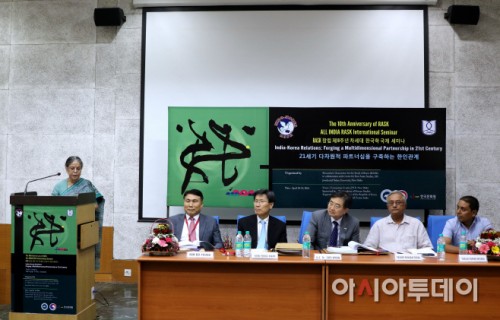 (Left) RASK editor Sushila Narsimhan (former professor of Japanesestudies at Delhi University) introduces books published in celebration of the10th anniversary of RASK at JNU Convention Center on April 18. (From left) Prof.Kim Do-young, RASK founder and professor at Delhi University; Prof. YoonYoung-kwan, honorary professor at Seoul National University; Dr. Jo Hyun,Ambassador of Korea; Mr. Skand Tayal, Former Indian Ambassador; Mr. ShashiKumar Mishra, Assistant Professor at Central University of Jharkhand andPresident at RASK. /Photographed by Ha Man-joo (Left) RASK editor Sushila Narsimhan (former professor of Japanesestudies at Delhi University) introduces books published in celebration of the10th anniversary of RASK at JNU Convention Center on April 18. (From left) Prof.Kim Do-young, RASK founder and professor at Delhi University; Prof. YoonYoung-kwan, honorary professor at Seoul National University; Dr. Jo Hyun,Ambassador of Korea; Mr. Skand Tayal, Former Indian Ambassador; Mr. ShashiKumar Mishra, Assistant Professor at Central University of Jharkhand andPresident at RASK. /Photographed by Ha Man-joo |
Kim Do-young, Chairman of RASK and professor of East Asian Studies at Delhi University, said, "I feel that RASK has become strong after ten years of its establishment. It is now being recognized as the largest and most fruitful organization as a next generation researchers gathering among the three countries - Korea, China, and Japan. It is also a hard thing in India to find an organization that has more than 50 scholars with more than 6 to 7 years of membership working together actively without a single research institute."
While RASK holds an international seminar and publishes a collection of workshop presentations every year, its status as an academic society is considerably high within Indian academic society. So far, RASK has published 10 volumes of collection of dissertations and 5 books.
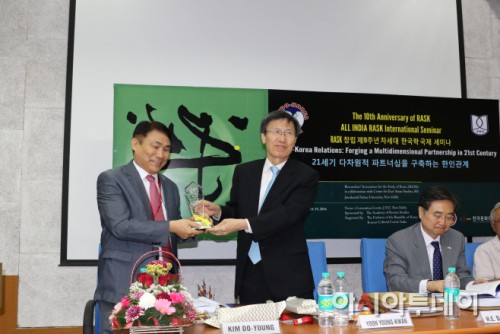 Prof. Kim Do-young (left), Chairman of RASK and professor of East AsianStudies at Delhi University, delivers an appreciation plaque to Prof. YoonYoung-kwan, honorary professor at Seoul National University, at JNU ConventionCenter on April 18./ Photographed by Ha Man-joo Prof. Kim Do-young (left), Chairman of RASK and professor of East AsianStudies at Delhi University, delivers an appreciation plaque to Prof. YoonYoung-kwan, honorary professor at Seoul National University, at JNU ConventionCenter on April 18./ Photographed by Ha Man-joo |
Prof. Kim said, "In order to make RASK truly the most powerful and competent academic society, we will proceed more strict screening for presentations in the future. The range of presentations will be expanded to cover engineering and natural sciences as well as humanities and social sciences."
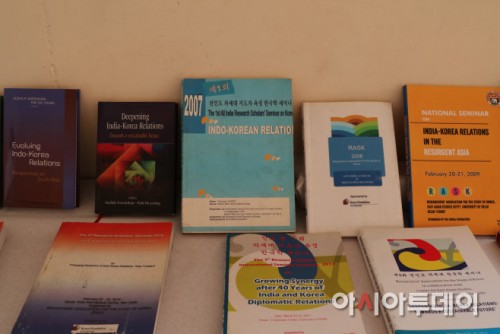 The collections of presentations and books issued by RASK/ Photographedby Ha Man-joo The collections of presentations and books issued by RASK/ Photographedby Ha Man-joo |
Regarding RASK's future plans, Prof. Kim said, "We plan to expand RASK's scope of activities to South Asia. In order to do this, we will soon establish an institute for Korean studies. The institute will establish an office in Korean Culture Centre in New Delhi for a while."
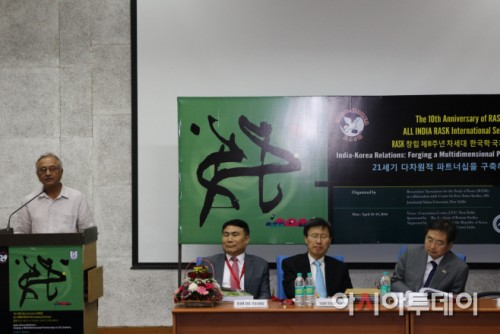 Skand Ranjan Tayal, former Indian Ambassador, delivers a congratulatoryspeech at a two-day international seminar on "Indo-Korea Relations:Forging a Multidimensional Impact on Asia in 21st Century" held atJawaharlal Nehru University (JNU) Convention Center on April 18./ Photographedby Ha Man-joo Skand Ranjan Tayal, former Indian Ambassador, delivers a congratulatoryspeech at a two-day international seminar on "Indo-Korea Relations:Forging a Multidimensional Impact on Asia in 21st Century" held atJawaharlal Nehru University (JNU) Convention Center on April 18./ Photographedby Ha Man-joo |
During the opening ceremony of the event, former Indian Ambassador Skand Ranjan Tayal pointed out that Korea has already carried out most of the policies that India is pursuing now 30 years ago, and that Indian academic world should provide a substantial research performance so that Indian policy makers could immediately take advantage of.
Mr. Skand Tayal said the answer to Narendra Modi's economic and social transformation initiative is in Korea 30 years ago. He held up Saemaul Undong (New Community Movement), Smart City, New City, high-speed train, and health insurance as examples.
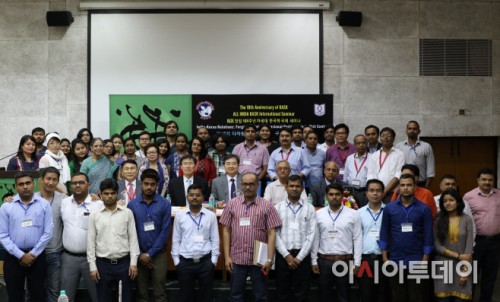 In celebration of 10th anniversary of Researchers' Association of theStudy of Korea (RASK), the international seminar entitled, "Indo-KoreaRelations: Forging a Multidimensional Impact on Asia in 21st Century", washeld at Jawaharlal Nehru University (JNU) Convention Center on April 18.Participants from 25 universities and 17 research institutes in India gatheredfor a picture./ Photographed by Ha Man-joo In celebration of 10th anniversary of Researchers' Association of theStudy of Korea (RASK), the international seminar entitled, "Indo-KoreaRelations: Forging a Multidimensional Impact on Asia in 21st Century", washeld at Jawaharlal Nehru University (JNU) Convention Center on April 18.Participants from 25 universities and 17 research institutes in India gatheredfor a picture./ Photographed by Ha Man-joo |
Most Read
-
1
-
2
-
3
-
4
-
5
-
6
-
7




















